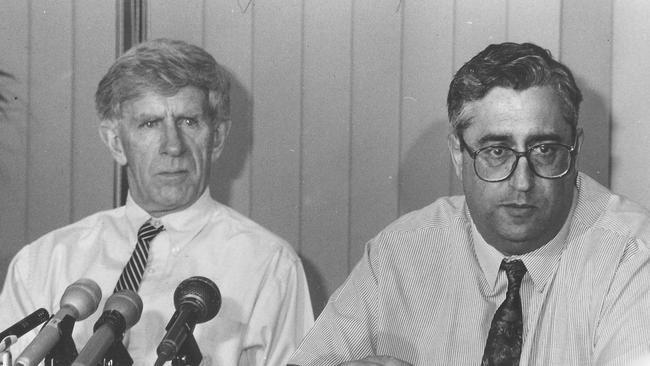Cabinet Papers 1992-93: soldiers’ sexuality ‘not for policy makers’
Working group on homosexual policy in ADF found soldiers’ sexuality was “for historians, not a guide for policy makers.”

A 1992 caucus joint working group on homosexual policy in the Australian Defence Force considered the “great soldiers argument” of the “alleged homosexuality of Alexander the Great, Lawrence of Arabia, Richard the Lionheart and Lord Kitchener, and the bisexuality of Julius Caesar”.
However, the caucus committee found the soldiers’ sexuality was “a matter of concern for historians and not a guide for policy makers in the latter part of the twentieth century”, according to 1992 and 1993 cabinet papers released today by the National Archives of Australia.
The documents show the Keating government’s overturning of a ban on homosexual members of the armed forces occurred despite opposition from defence minister Robert Ray, who was overruled by cabinet colleagues led by attorney-general Michael Duffy.
The ban on gay defence force members was introduced in 1986 in response to the ACT government’s 1985 decriminalisation of homosexual acts, and stated: “Homosexual behaviour is not accepted or condoned in the Defence Force. The ADF policy on homosexuality is that when a member admits to or is proven to be involved in homosexual conduct, consideration is to be given to the termination of that member’s service.”
Momentum built for the ban to be overturned after lesbian naval officer Anita Van Der Meer challenged her dismissal from the Navy in the Human Rights and Equal Opportunities Commission in 1990, shortly after sexual orientation was added to the commission’s terms of reference, prompting Ray to announce a review of the policy.
On 18 June 1992 Ray announced a new policy on Unacceptable Sexual Behaviour, developed in consultation with the HREOC to address human rights obligations, which stated: “The ADF has no concern with the sexual activities of its members provided they are not unlawful and are not contrary to or inconsistent with the inherent requirements of the ADF.”
But at the same time as adopting the 1992 policy, Ray also announced that the 1986 policy would not be changed.
As Duffy states in the cabinet documents, the problem was that the 1986 and 1992 policies were “mutually inconsistent”.
On June 24, caucus decided to refer the issue to a caucus committee, and the following day cabinet decided that Ray and Duffy were to bring forward a joint cabinet submission examining the implications of retention or abolition of the 1986 policy and taking the committee’s findings into account.
On September 18 the committee recommended that the 1992 policy be endorsed by cabinet, that the 1986 policy be made inoperative, and that the ADF implement management and training policies to eliminate sexual preference discrimination in the ADF.
The committee’s recommendations were soon followed by an HREOC report which found the 1986 policy was inconsistent with Australia’s international human rights obligations and recommended it be revoked immediately.
Ray made an unsuccessful last-ditch attempt to have the revocation of the ban deferred until there had been a comprehensive survey of the attitudes of ADF commanders and members, arguing group cohesion, bonding and teamwork were the key to survival and success in combat.
“Homosexual behaviour or tendencies destroy the intimate bonding of the group because of the fear that the physical and psychological elements of military cohesion may be misrepresented and mistrusted as sexual in nature and, therefore, intrusive and threatening,” Ray argued in his submission.
Ray failed to convince a majority of his colleagues, with cabinet agreeing to Duffy’s proposal to revoke the ban on November 23.
Duffy tabled the HREOC report on November 24, the same day Prime Minister Paul Keating announced the revocation of the ban.
The cabinet documents list compliance with international human rights obligations and advice on legal and policy matters arising under human rights legislation as underpinning the decision.
The revocation was also seen as consistent with the government’s policies on social justice and equality of opportunity and the national HIV/AIDS strategy.
The move placed Australia ahead of several comparable militaries, including the UK and the US, both of which only lifted restrictions in 2011.
Minutes from the cabinet meeting on November 23 note that while the government expected the decision to be supported by “civil liberties groups and the homosexual community”, it expected criticism from “elements of the ADF and probably groups such as the RSL”.
In response to the decision, RSL national president Brigadier Alf Garland told the Sydney Morning Herald homosexuals were “sexual deviants who have a medical problem and should not be treated any differently to drug addicts”.
Garland’s views were by no means universal among veterans, with high-profile WWII prisoner-of-war Weary Dunlop telling the same newspaper there had always been homosexuals in the armed services.
“Don’t let us delude ourselves ... It is a mistake if you start labelling people too hard,” he said.
The National Archives of Australia today released selected key Cabinet records for 1992 and 1993








To join the conversation, please log in. Don't have an account? Register
Join the conversation, you are commenting as Logout